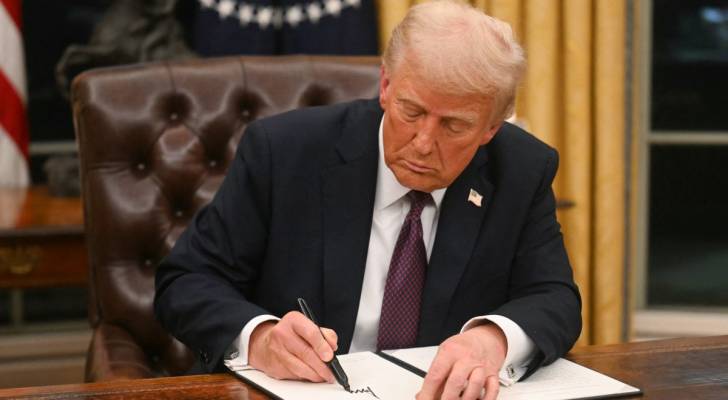Trump signs order to end citizenship for babies born to immigrants

Roya News
US President Donald Trump directed government agencies to cease issuing citizenship documentation for babies born in the US to undocumented parents.
This order, signed during a flurry of immigration-related directives in the Oval Office, aims to reinterpret the 14th Amendment, which traditionally grants citizenship to all individuals born on US soil. Legal experts have quickly labeled this move as illegal and anticipate immediate challenges in the courts.
During his inaugural address, Trump announced plans to invoke the Alien Enemies Act of 1798, a wartime authority, to mobilize federal and state law enforcement to combat foreign gangs and criminals. “I have no higher responsibility than to defend our country from threats and invasions,” he asserted. “We will do it at a level that nobody has ever seen before.”
- Who does not get the citizenship? -
The order lists two specific groups of people who will not automatically become US citizens just because they were born in the US:
If the baby's mother was in the US illegally and the father is not a US citizen or a legal resident.
If the mother was in the US legally but only temporarily (like a tourist) and the father is not a US citizen or a legal resident.
Implementation timeline: This new rule will apply to babies born 30 days after the order is signed.
The President declared a national emergency at the southern border, signaling a revival of border wall construction and the deployment of military resources to bolster border security. “All illegal entry will be halted,” he stated emphatically.
As part of these new policies, asylum seekers who had previously made appointments through the CBP One mobile app found their plans abruptly canceled. Trump's administration also terminated categorical parole programs that had allowed 30,000 migrants per month to enter the US through airports from nations like Cuba, Venezuela, Haiti, and Nicaragua.
The Laken Riley Act, which mandates jailing immigrants accused of minor property crimes, received support from a bipartisan group of lawmakers, further solidifying Trump's immigration agenda. Named after a Georgia nursing student whose murder by a Venezuelan migrant captured national attention, the bill is expected to pass in the House and could be the first signed into law by Trump.
Highlighting the armed forces' role in securing US borders, Trump instructed the Secretary of Defense to provide a comprehensive plan within ten days to ensure the borders' integrity. Additional orders will reinstate the “Remain in Mexico” policy from Trump’s earlier term and designate drug cartels as foreign terrorist organizations. Moreover, refugee admissions will be paused for four months.
Trump's swift executive actions are designed to catch immigration advocates off guard, reflecting his administration's view that his electoral victory signifies a mandate for sweeping changes in US immigration policy.
However, legal experts, including California Attorney General Rob Bonta, are preparing to challenge these measures, stating, “This is hallmark Trump, doing what he wants, when he wants, how he wants, the US Constitution be damned. That’s not how it works in our democracy.”
Details regarding the practical implementation of these policies in accordance with federal law and international treaties remain sparse. Officials have not clarified when military personnel will be deployed to the southern border or the scope of their engagement with drug cartels.
The effort to eliminate birthright citizenship reflects longstanding conservative goals to curtail what they perceive as excessive immigration. Trump's directive would prevent the State Department from issuing passports to US-born children of undocumented immigrants and direct the Social Security Administration to disregard their citizenship status, with implementation expected within 30 days.
While the exact number of US-born children with undocumented parents remains unclear, the Pew Research Center estimates that about 4.4 million children under 18 were living with undocumented parents in 2022.
Despite previous threats to revoke birthright citizenship in 2018 and 2019, Trump never acted on them. Legal interpretations have generally upheld that children of undocumented immigrants are US citizens, though the Supreme Court has yet to provide a definitive ruling on the matter.
As the Biden administration faced rising illegal border crossings, averaging 2 million per year, it crafted policies intended to redirect migrants towards legal entry pathways while implementing stricter border control measures. In the final year of Biden’s term, illegal crossings reportedly dropped by over 80 percent, with current data indicating that more migrants are attempting to enter through official ports of entry rather than illegally.
Following Trump's inauguration, asylum seekers waiting at the border received a stark message: “Existing appointments are no longer valid,” leaving thousands of migrants in limbo.




